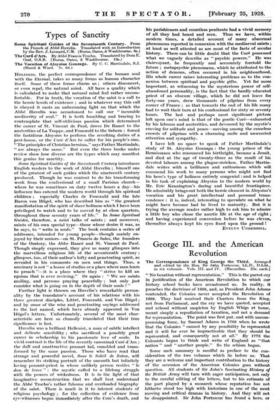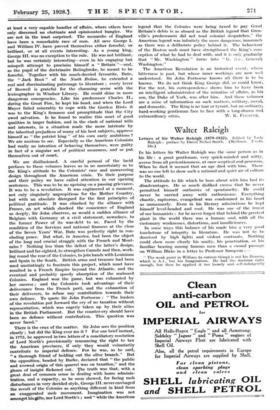George III. and the American Revolution
The Correspondence of King George the Third. Arranged
and edited by the Hon. Sir John Fortescue, LL.D., D.Litt., in six volumes. Vols. HI and IV. (Macmillan.. 25s. each.)
" No taxation without representation." This is the parrot-cry in justification of the American Revolution to which our history school books have accustomed us. In reality, it preaches the doctrines of 1688, and, as President John Adams contended, the Colonies never accepted the Revolution of 1688. They had received their Charters from the King, not from Parliament, and the cry we have quoted, accepted and echoed without suspicion by English Whigs at home, meant simply a repudiation of taxation, and not a demand for representation. The point was first put, and with uncom- promising force, by Samuel Adams in 1768 when. he wrote that the Colonies " cannot by any possibility be represented and it will for ever be impracticable that they should be represented, and consequently not at all." By 1773 the Colonists began to think and write of England as "that nation " and " another people." So the schism began.
Some such summary is needful as preface to the con- sideration of the two volumes which lie before us. That they are a welcome and important contribution to the history of the secession of the American Colonies goes without question. All students of Sir John's fascinating History of the British Army will turn with eager anticipation, not only to the careful editing of the letters, but to his estimate of the part played by a monarch whose reputation has not hitherto stood too high with historians in one of the most moving and critical dramas in history. And they will not be disappointed. Sir John Fortescue has found a hero, or
at least a very capable handler of affairs, where others have only discerned an obstinate and opinionated bungler. • We: are not in the least surprised. The monarchs of England have been a remarkable race of men. All save George I. and William IV. have proved themselves either forceful,: or• brilliant, or at all events interesting. As a young king, George III. was no exception to the rule. He was not brilliant, but he was certainly interesting—even in his engaging but misspelt attempt to proclaim himself a " Britain "—and, as the pupil of the doctrinaire Bolingbroke, he meant to be forceful. Together with his much-decried favourite, Bute, the " Jack Boot " of the North Briton, he extended a real and discriminating patronage to literature ; every lover of Boswell is grateful for the charming scene with the. lexicographer in Windsor Library. He could shine in more dangerous emergencies. Like his predecessor Charles IL, during the Great Fire, he kept his head, and when the Lord Mayor failed miserably to cope with the Gordon Riots it was to the King's firmness and promptitude that the City owed salvation. Is he found to realize this asset of good qualities in larger fashion, and in the clash of national wills and interests, in a situation made the more intricate by the inherited prejudices of many of his best subjects, approve himself as " the patriot king " of his own early ambitions ? We are anxious to see. Especially as the American Colonists had really no intention of behaving themselves, were guilty in fact of a singular act of political meanness, and so put themselves out of court.
We are disillusioned. A careful perusal of the lucid prefaces to these volumes leaves us in no uncertainty as to the King's attitude to the Colonists' case and unwavering design throughout the American crisis. To their purpose and their policy we have called attention in our opening sentences. This was to be no uprising on a passing grievance. It was to be a revolution. It was engineered at a moment, not only singularly unpropitious for the Mother Country, but with an absolute disregard- for the first principles of political gratitude. It was clinched by the alliance with France, an act which shocked the conscience of England as deeply, Sir John observes, as would a sudden alliance of Belgium with Germany at a civil statement, nowadays, to the former Power of its war-debt to us. Faced by the condition of the Services and national finances at the close of the Seven Years' War, Bute was perfectly right in con- cluding peace. But what, in America, had been the object of the long and crucial struggle with the French and Mont- calm ? Nothing less than the defeat of the latter's design, brilliant and far-sighted, to strengthen Canada and then, work- ing round the rear of the Colonies, to join hands with Louisiana and Spain in the South. British arms and treasure had been used unstintingly to frustrate this project, which must have resulted in a French Empire beyond the Atlantic, and the eventual and probably speedy absorption of the seaboard Colonies. England won the game, but was exhausted by her success ; and the Colonists took advantage of their deliverance from the French peril, and the exhaustion of their deliverers; to refuse any contribution towards their own defence. To quote Sir John Fortescue : " The leaders of the revolution put forward the cry of no taxation without representation, which was eagerly taken up by their allies in the British Parliament. But the counter-cry should have been no defence without contribution. This question was never faced."
There is the crux of the matter. Sir John sees the position clearly ; but did the King ever gee it ? For one brief instant, in 1775, he approved in two letters of a conciliatory resolution of Lord North's provisionally renouncing the right to tax the American provinces, if only they would voluntarily contribute to imperial defence. For he was, as he said, " a thorough friend of holding out the olive branch." But the opposition, headed by Burke, declared that " the public and avowed origin of this quarrel was on taxation," and the gleam of insight flickered out. The truth was that, with a great deal of common sense in dealing with home adminis- tration, and a capacity, as he soon showed, for facing mob disturbances in very decided style, George III. never envisaged the revolt of the Colonies as anything different in kind from an exaggerated mob movement. Imagination was not amongst his gifts, nor Lord North's ; and " while the American legend that the Colonies were being taxed to pay Great Britain's debts is as absurd as the British legend that Gren- ville's predecessors did not read colonial despatches," the American legend was infinitely the more dangerous, inasmuch as there was a deliberate policy behind it. The behaviour of the Boston mob must have strengthened the King's con- ception of what he had to deal with, and it is only gradually that " Mr. Washington " turns into " G. (i.e., General) Washington."
The American Revolution is an historical event, whose bitterness is past, but whose inner workings arc now well understood. Sir John Fortescue knows all there is to be known. We do not think King George did, or could know. For the rest, his correspondence shows him to have been an intelligent administrator of the minutiae of affairs, as his son, the Duke of York, was after him. And these volumes. are a mine of information on such matters, military, naval,. and domestic. The King is no tsar or tyrant, but an ordinary, hard-working gentleman face to face with a long-drawn and.









































 Previous page
Previous page